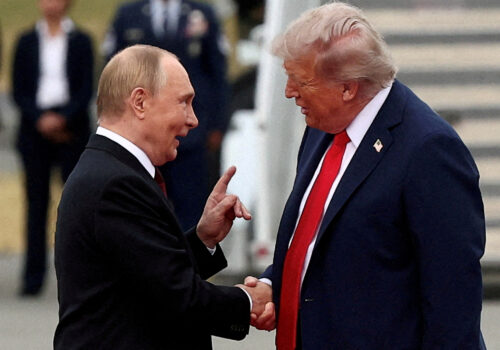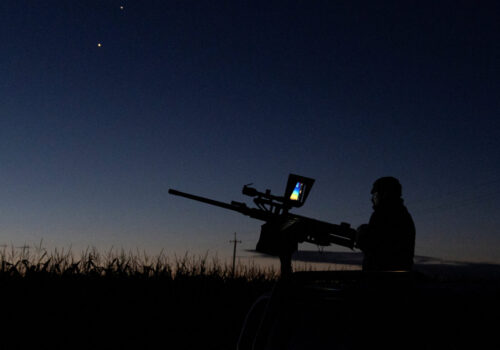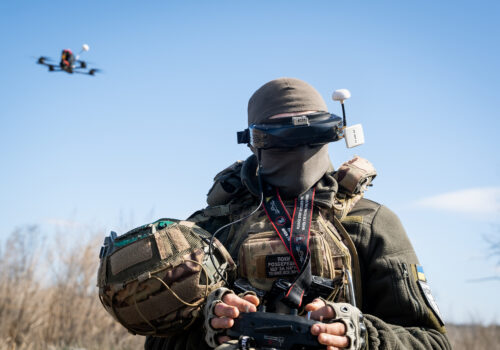As Russia’s full-scale invasion of Ukraine approaches the four-year mark, Moscow is facing increasing difficulties replenishing the ranks of its invading army. With fewer Russians now prepared to volunteer, the Kremlin is seeking to recruit more foreign fighters to serve in Russian President Vladimir Putin’s colonial war.
A number of recent media reports have highlighted the growing role of foreign nationals in the Russian military. In early October, an Indian citizen was captured by Ukrainian forces while fighting for Russia. The 22 year old claimed to have been arrested in Russia while studying and pressured into signing a contract with the Russian army in order to secure his release from prison. After just two weeks of basic training, he was sent to the front lines of the war in Ukraine.
Also in early October, the Los Angeles Times reported that Russia may have recruited tens of thousands of foreign fighters via social media, with many coming from disadvantaged countries across the Middle East, Africa, and East Asia. The article detailed how many of these recruits are allegedly enticed with offers of generous benefits including large salaries and Russian citizenship in exchange for military service in non-combat roles. In practice, however, most are soon sent straight into battle.
Meanwhile, a group of more than twenty Kenyan men were rescued from a suspected human trafficking ring in September following a raid on a residential complex in Nairobi. The men had reportedly been promised jobs in Russia but were set to be sent to fight in Ukraine. The multi-agency operation highlighted growing concerns that Moscow is stepping up efforts to lure African men to Russia and forcing them to join the Russian army.
Stay updated
As the world watches the Russian invasion of Ukraine unfold, UkraineAlert delivers the best Atlantic Council expert insight and analysis on Ukraine twice a week directly to your inbox.
The single largest contingent of foreigners currently fighting for Russia may be Cubans. An October 2 cable from the US State Department sent to dozens of US diplomatic missions claimed that up to 5000 Cuban nationals are currently serving in the ranks of Putin’s army. Ukrainian officials say the total number could actually be far higher and estimate that as many as 20,000 Cubans may have been recruited by Russia.
While Russian officials have typically been tight-lipped about the presence of foreigners in the country’s military, some have recently acknowledged the growing presence of Cuban troops. Andrey Kartapolov, who heads the Russian Parliament’s Defense Committee, defended the practice of recruiting Cubans and indicated that many more may soon be joining the invasion of Ukraine. “If young people from Cuba want to help our country, there is nothing strange about that,” he commented.
This increasing openness has also been evident in relation to the participation North Korean soldiers in Russia’s war. When reports first emerged of North Korean troops being deployed to Russia in late 2024, the Kremlin responded with a series of denials. Months later, Putin himself officially confirmed the presence of a North Korean contingent. “We will always honor the Korean heroes who gave their lives for Russia, for our common freedom, on an equal basis with their Russian brothers in arms,” he commented in April 2025.
Eurasia Center events

It is easy to understand why Moscow is so interested in enlisting foreigners to support the Russian invasion of Ukraine. According to Britain’s Ministry of Defense, more than one million Russian soldiers have been killed or wounded since the start of the full-scale invasion, making the current war by far the costliest undertaken by the Kremlin since World War II.
The human wave tactics favored by Russian commanders require a steady supply of fresh troops, but Moscow is reluctant to conscript large numbers of Russian civilians into the army. A partial mobilization in September 2022 sparked a major backlash, with hundreds of thousands of Russians fleeing the country to avoid wartime service. Instead, the Kremlin has focused on sourcing manpower from Russia’s prison population and attracting volunteers by offering increasingly large financial incentives. CNN reports that numerous Russian regions have dramatically increased the amounts they offer to new recruits in recent months amid a decline in volunteers.
There are growing indications that the current approach may no longer be enough to compensate for Russia’s heavy losses on the front lines in Ukraine. The number of new recruits receiving signing-on bonuses during the second quarter of 2025 was the lowest in two years, according to research by independent Russian investigative outlet iStories based on Russian federal budget data. The outlet’s findings indicated that around 38,000 people volunteered for military service between April and June 2025, two and a half times lower than the figure for the same period one year earlier.
The Kremlin’s appetite for foreign fighters is not merely an attempt to make up the numbers. Crucially, Moscow also regards the recruitment of non-Russian troops as significantly cheaper and less politically risky. Since 2022, the Kremlin has established an extensive system of compensation payments for Russian soldiers killed or wounded in Ukraine. None of this applies to foreigners. Likewise, every Russian military death on the Ukrainian front lines risks fueling anti-war sentiment at home, while casualties from faraway lands have virtually no impact on Russian public sentiment.
These factors have encouraged Putin and other Kremlin leaders to view foreign fighters as an expendable alternative to dwindling numbers of Russian recruits. “If a foreigner dies, there are no social payouts and no responsibility. There are no relatives inside Russia who are unhappy with the war, and of course there are fewer dead Russians,” Ukrainian Military Intelligence spokesman Andriy Yusov told US Congress officials in September.
Moscow’s efforts to secure more foreign troops are an indication of the mounting manpower challenges confronting the Kremlin. Russia is still a very long way from running out of soldiers, but Putin has no more easy options as he seeks to replenish his decimated invasion force and continue the war into a fifth year. With declining numbers of Russians prepared to risk their lives in exchange for financial incentives, Putin may have to choose between a deeply unpopular mobilization or a further expansion of Russia’s international recruitment campaign. Neither option is likely to produce the kind of skilled and motivated fighting force capable of defeating Ukraine.
The presence of assorted Cubans, North Koreans, Indians, Africans, and other foreign troops within Putin’s military directly undermines widespread but misleading notions of Russia’s limitless resources. In reality, the Russian army in Ukraine is increasingly overstretched and may be far more vulnerable than Moscow would like us to believe. This should motivate Kyiv’s partners to expand their support for the Ukrainian war effort. Putin currently has no interest in ending his invasion, but the prospect of military defeat could force him to accept the necessity of a negotiated peace deal.
David Kirichenko is an associate research fellow at the Henry Jackson Society.
Further reading
The views expressed in UkraineAlert are solely those of the authors and do not necessarily reflect the views of the Atlantic Council, its staff, or its supporters.

The Eurasia Center’s mission is to enhance transatlantic cooperation in promoting stability, democratic values, and prosperity in Eurasia, from Eastern Europe and Turkey in the West to the Caucasus, Russia, and Central Asia in the East.
Follow us on social media
and support our work
Image: A Russian army officer talks to conscripts called up for military service during a ceremony marking their departure for garrisons, in Bataysk in the Rostov region, Russia, October 15, 2025. (REUTERS/Sergey Pivovarov)





